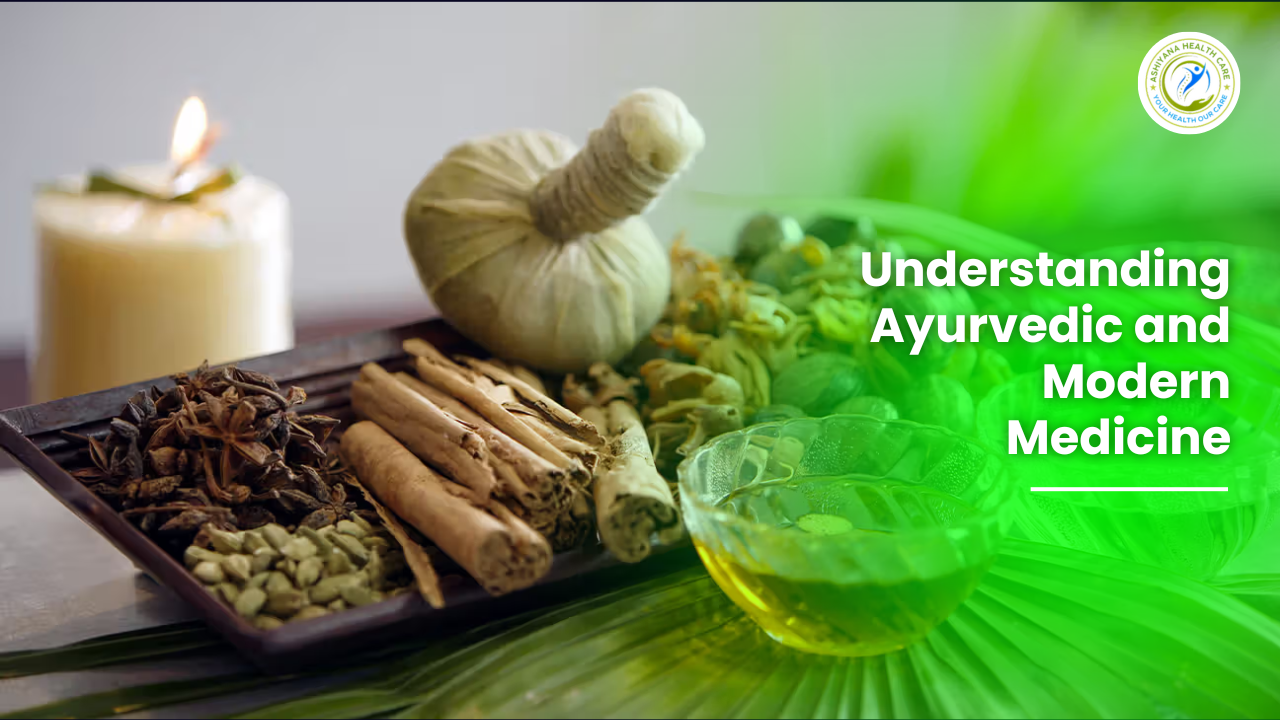
Understanding Ayurvedic and Modern Medicine: How to Choose the Best Treatment for Your Health Needs
India’s rich heritage in traditional medicine, particularly Ayurveda, coexists with advancements in modern medicine. Both systems have their unique strengths and approaches to healing. For patients, understanding the differences and knowing when to choose one over the other can make a significant difference in achieving optimal health. Ashiyana Healthcare is dedicated to helping individuals make informed decisions by integrating the best of both worlds.
What is Ayurveda?
Ayurveda is an ancient Indian system of medicine that dates back over 5,000 years. It focuses on holistic healing by balancing the mind, body, and spirit. Ayurvedic treatments often involve:
- Herbal Remedies: Use of natural herbs and plants to treat ailments.
- Dietary Changes: Tailoring food choices to an individual’s body type or “prakriti.”
- Panchakarma Therapy: Detoxification processes to cleanse the body.
- Yoga and Meditation: Practices to improve physical and mental well-being.
Ayurveda emphasizes prevention and lifestyle changes to maintain long-term health.
What is Modern Medicine?
Modern medicine, also known as allopathic medicine, is based on scientific research and evidence. It involves:
- Medications: Drugs designed to target specific diseases or symptoms.
- Surgeries: Procedures to repair or remove damaged tissues or organs.
- Diagnostic Tools: Advanced technologies like MRIs, CT scans, and blood tests to identify health issues accurately.
- Emergency Care: Rapid interventions for acute conditions such as heart attacks or injuries.
Modern medicine focuses on treating symptoms and curing diseases with a high degree of precision and efficiency.
Key Differences Between Ayurveda and Modern Medicine
|
Aspect |
Ayurveda |
Modern Medicine |
|
Approach |
Holistic and preventive |
Symptom-focused and curative |
|
Treatment Methods |
Natural remedies and lifestyle changes |
Medications, surgeries, and technologies |
|
Timeframe |
Gradual healing |
Faster relief for acute conditions |
|
Side Effects |
Minimal when administered correctly |
Potential side effects from medications |
|
Customization |
Tailored to individual body types |
Standardized treatments based on research |
When to Choose Ayurveda
Ayurveda can be an excellent choice in the following scenarios:
- Chronic Conditions: For long-term management of conditions like arthritis, digestive issues, or stress-related disorders.
- Preventive Care: To strengthen immunity and maintain overall well-being.
- Lifestyle Management: For improving sleep, reducing stress, or achieving weight loss through natural methods.
- Detoxification: To cleanse the body of toxins and rejuvenate the system.
When to Choose Modern Medicine
Modern medicine is ideal for:
- Acute Conditions: Emergencies like infections, fractures, or heart attacks require immediate attention.
- Surgical Needs: Procedures like appendectomies, organ transplants, or tumor removal.
- Advanced Diagnostics: When precise and rapid diagnosis is necessary.
- Life-Threatening Diseases: Cancer treatments, organ failure, and severe infections.
Can Ayurveda and Modern Medicine Work Together?
The integration of Ayurveda and modern medicine, often referred to as integrative medicine, offers the best of both worlds. For instance:
- Post-Surgery Recovery: Ayurveda can aid in faster healing and reducing inflammation.
- Chronic Disease Management: Modern medicine controls symptoms, while Ayurveda addresses root causes.
- Mental Health: Modern therapies combined with Ayurvedic practices like meditation can improve outcomes.
At Ashiyana Healthcare, we encourage a collaborative approach, ensuring that treatments are safe, effective, and complementary.
How to Decide the Best Treatment for Your Needs
Choosing the right treatment depends on various factors:
- Nature of Illness: Acute illnesses often require modern medicine, while chronic issues may benefit from Ayurveda.
- Urgency: Emergencies demand immediate allopathic intervention.
- Personal Preferences: Some individuals prefer natural remedies over synthetic drugs.
- Medical History: Consult a healthcare professional to determine the safest option based on your history.
Tips for Making an Informed Decision
- Consult Professionals: Speak with qualified doctors from both disciplines.
- Research: Learn about your condition and available treatments.
- Consider Integrative Care: Explore how Ayurveda and modern medicine can complement each other.
- Evaluate Risks and Benefits: Weigh the pros and cons of each approach.
The Role of Ashiyana Healthcare
At Ashiyana Healthcare, we believe in empowering patients to make informed decisions about their health. Our services include:
- Expert Consultations: Access to experienced practitioners in both Ayurveda and modern medicine.
- Customized Treatment Plans: Tailored solutions based on individual needs.
- Holistic Care: Integrating lifestyle advice, diagnostic tools, and therapeutic options.
- Educational Resources: Workshops and materials to help you understand your options.
Conclusion
Ayurveda and modern medicine each have their unique strengths, and understanding their differences is key to making the right choice. While Ayurveda excels in holistic, preventive care, modern medicine is indispensable for acute and life-threatening conditions. Ashiyana Healthcare is here to guide you in selecting the best treatment for your health needs, ensuring a balanced approach to wellness.
Take charge of your health today. Visit Ashiyana Healthcare to explore our comprehensive care options and find the treatment that works best for you.
0 Comments on Healthy environment...